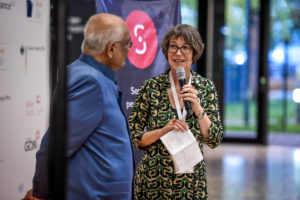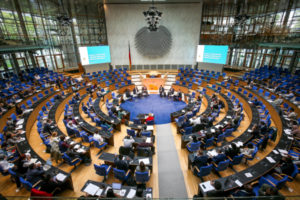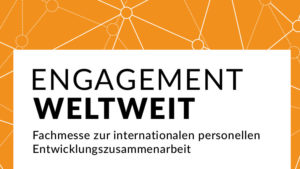Vom 23. bis 25. Oktober 2019 beging das Global Development Network (GDN) sein zwanzigjähriges Jubiläum mit einer Konferenz in Bonn. Unter dem Motto „Knowledge for Sustainable Development: The Research-Policy Nexus” trafen sich Expertinnen und Experten der Entwicklungszusammenarbeit, -politik und –forschung im World Conference Center Bonn. Das Deutsches Institut für Entwicklungspolitik (DIE) und weitere Institutionen waren Mitveranstalter der Konferenz.
Der Fokus der GDN-Konferenz lag auf der Schnittstelle zwischen Forschung und Politik bei der Umsetzung der Agenda 2030 – ein Thema, dem sich das DIE unter anderem durch Wissenskooperation und seine Arbeit bei der Wissenschaftlichen Beratung zu nachhaltiger Entwicklung widmet. In verschiedenen Veranstaltungen unterstrichen die Panelisten und Gäste, dass ein Blick über thematische Silos hinweg notwendig ist, um komplexe Herausforderungen, wie die Sustainable Development Goals (SDGs) zu erreichen. Eine Besonderheit der GDN-Konferenz war dabei die große Teilhabe von Forschenden und Praktikern aus dem Globalen Süden. Die Konferenz bot eine Plattform für offene Diskussionen, die verschiedene Perspektiven auf relevantes Wissen für nachhaltige Entwicklung zuließen.
Die Konferenz konzentrierte sich auf miteinander verknüpfte Themen, die in Plenardiskussionen, kleineren Workshops und Panels aufgegriffen wurden: Interdisziplinäre Forschung und Wissensaustausch, die Herausforderungen der nachhaltigen Entwicklung, die digitale Transformation und individuelle Verantwortung, sowie Nachhaltigkeit in der Forschung.

Die Kommissarische Direktorin des DIE, Imme Scholz, leitete die Eröffnungsveranstaltung, die der Frage nachging, wie weit die Umsetzung von Forschung in Handeln in der nachhaltigen Entwicklung fortgeschritten ist. Die Diskussion zeigte dabei auf, dass es mehr Offenheit für neue Konzepte von Entwicklung, eine Vielfalt von Methoden und interdisziplinären Ansätzen, sowie die Freiheit braucht schwierige Fragen zu stellen. Am zweiten Tag der Konferenz präsentierte Imme Scholz darüber hinaus gemeinsam mit dem Vorsitzenden von Southern Voice, Debapriya Bhattacharya, deren neue Studie State of the Sustainable Development Goals’.
Video Impressionen des 1. Tages
Ansätze für die Verbesserung der Beziehungen von Forschenden und Entscheidungstragenden sowie der breiteren Gesellschaft war der Schwerpunkt der Konferenz. In einer von der European Association of Development Research and Training Institutes (EADI) organisierten Paneldiskussion, die von Sven Grimm, Leiter des Programms Inter- und transnationale Zusammenarbeit am DIE, geleitet wurde, diskutierten die Teilnehmenden die ethischen Abwägungen von Politikgestaltenden, Forschenden und der Zivilgesellschaft. Während die Politik die Balance von gesellschaftlichen Interessen hält, untersuchen Forschende die Kosten und Nutzen solcher Kompromisse, die wiederum zu politischen Spannungen beitragen können. In einigen Situationen berät sich die Forschung eng mit Entscheidungstragenden, um Probleme anzugehen und transformative Forschung zu betreiben. In anderen Fällen wählt sie einen distanzierteren Ansatz. Die Einbeziehung des Staates und gesellschaftlicher Akteure in den Forschungsprozess benötigt dabei eine fortschreitende Klarstellung der Rollen und ein kritisches Reflektieren ethischer Fragen.
Letzteres war auch Thema bei einer Diskussion über Ethik in der Entwicklungsforschung, organisiert von Lennart Kaplan und Jana Kuhnt. Sie luden die Konferenz-Gäste dazu ein, das Thema „Ethics in development research: Doing no harm to research staff when conducting research in developing countries“ zu diskutieren. Die Veranstaltung beleuchtete dabei den schmalen Grat zwischen Helfen und Hindern, dem Forschende bei Ihrer Arbeit in Entwicklungsländern begegnen. Eine systematische Literaturauswertung von Kaplan und Kuhnt stellt dabei fest, dass Forschende sich dieser Frage vor ihrer Feldforschung bewusst sein sollten, man sich auf einige Situationen jedoch kaum vorbereiten kann. Mehr Informationen über die Forschung des DIE zu diesem Thema, gibt es auf der Webseite des Projekts.

Am zweiten Tag der Konferenz veranstaltete das DIE eine Paneldiskussion zu transnationaler Wissenskooperation für globale nachhaltige Entwicklung. Das Event, welches von Anna Schwachula geleitet wurde, kehrte dabei zum Kernthema der Konferenz zurück: dem Wissensaustausch. Die Panelisten waren aufgefordert, die realen Implikationen von Konzepten, wie „Koproduktion von Wissen“ oder „Kooperation auf Augenhöhe“ zu diskutieren. Paulo Esteves (BRICS Policy Centre, Brazil) stellte dabei die Herausforderungen in der Kooperation zwischen Forschungspartnern mit vielfältigen Hintergründen und Forschungsfeldern heraus. Dies gilt sowohl in der Nord-Süd- als auch der Süd-Süd-Kooperation. Laut Esteves werden diese Probleme durch Regierungen verstärkt, die die Menschenrechte und demokratischen Prinzipien in Frage stellen. Citlali Ayala (Instituto Mora, Mexico) präsentierte zehn Prinzipien der gemeinsamen Wissensproduktion, die globalen Kooperationsnetzwerken dabei helfen, mit globalen Herausforderungen umzugehen. Julia Schöneberg (Universität Kassel) zeigte auf, wie postkoloniale Machtverhältnisse (z.B. die erkenntnistheoretische Vormachtstellung) in Wissensnetzwerken fortbestehen. DIE-Expertin Johanna Vogel zeigte, anhand des MGG Networks, wie Wissensnetzwerke bleibende Beiträge zur nachhaltigen Entwicklung liefern können.
Eine weitere DIE-Präsentation konzentrierte sich auf die Effekte von Umweltklauseln in Handelsabkommen. Das DIE nutzt einen umfangreichen Datensatz – entwickelt von Jean-Frédéric Morin – um sein TREND analytics tool zu speisen. Das Online-Tool analysiert über 300 unterschiedliche Umweltklauseln aus den Gesamttexten von rund 630 Handelsabkommen seit 1945. In der Präsentation der Forschungsergebnisse, zeigte DIE-Experte Axel Berger die positiven Effekte auf, die diese Art von Klauseln mit sich bringen. Sie reichen von der Reduktion der Umweltverschmutzung, bis hin zur Förderung von grünen Produktionsmethoden und Exporten.
Video Impressionen des 2. Tages
Am letzten Tag der Konferenz traf sich DIE-Experte Daniele Malerba mit Kolleginnen und Kollegen anderer Institutionen, um die Umsetzung der SDGs m Globalen Süden zu diskutieren. Die Veranstaltung wurde von EADI organisiert.
Während der drei Konferenztage präsentiert das DIE darüber hinaus die vielseitige Arbeit von Managing Global Governance, unter anderem in den Bereichen Nachhaltigkeitsstandards, Digitalisierung und wie Training an Öffentlichen Verwaltungsschulen zur Agenda 2030 beitragen kann. Am DIE-Messestand tauschten sich darüber hinaus zahlreiche Fachkräfte aus dem Globalen Norden und Süden über die Arbeit des Institutes aus. Im Sinne der Stärkung des research-policy nexus, werden wir die dort geknüpften Verbindungen vorantreiben.
Die Konferenz wurde gemeinsam von GDN, DIE, dem Deutschen Evaluierungsinstitut der Entwicklungszusammenarbeit (DEval), der Bonner Allianz für Nachhaltigkeitsforschung (ICB) und dem Institute for Environment and Human Security der United Nations University in Bonn organisiert. Die Konferenz fand unter der Schirmherrschaft des Bundesministeriums für wirtschaftliche Zusammenarbeit und Entwicklung (BMZ) statt und wurde durch das Auswärtige Amt (AA) und die Sparkassenstiftung für internationale Kooperation unterstützt.
Video Impressionen des 3. Tages

